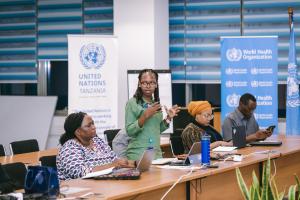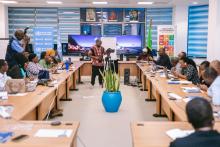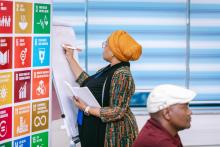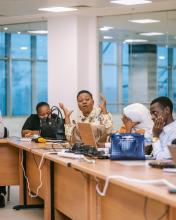Journalists urged to accurately disseminate health information to improve health reporting in Tanzania.
Dar es Salaam - In a ground-breaking move to enhance health communication and journalism, the World Health Organization (WHO) in Tanzania urged journalists to accurately disseminate health information to improve health reporting in the country.
This statement was made at the round table discussion hosted by WHO in collaboration with the Ministry of Health with over 40 journalists to delve into specific needs and priorities and contribute to bridging the health information gap, fight health misinformation and ultimately champion the right to access correct health information in the country.
The discussion is in line with the effort to co-design the first-ever Health Journalism Fellowship Programme in Tanzania. An initiative aimed at equipping journalists with the necessary skills to effectively communicate public health issues, combat misinformation, and promote well-being. It also seeks to build a network of health expert journalists and improve the quality and quantity of media coverage on key health topics and issues in Tanzania.
Dr. Neema Kileo, Programme Officer at WHO, highlighted the detrimental effects of inaccurate reporting, particularly during health crises, and urged journalists to prioritize accuracy in their reporting.
“Journalists and media professionals play an important role in shaping public perceptions by providing facts, insight and balanced information and helping populations make safe, and informed choices to protect their health – whether it is about an outbreak of an infectious disease or management of a chronic health condition. Partnering with health reporters is key to further the health for all agenda”, she added.
The recent COVID-19 pandemic highlighted how critical health journalism is in providing accurate and timely information to the population and fighting the spread of mis and disinformation - both related to the pandemic and across numerous other public health issues.
For Said Makora, Communications Officer at the Ministry of Health, the importance of obtaining information from trusted sources and fact-checking them before publishing is extremely crucial. “With the right tools and guidance, journalists have the capacity to largely influence citizens as well as exposing them to the right information expecially during outbreaks” he said.
The one-day discussions offered an opportunity to share experience and discuss how the programme will be delivered, priority training content to be covered and modalities of selecting fellows and mentors.
“This round table discussion is an inclusive initiative. I must commend WHO and the Ministry. Usually, programmes are initiated for us without our input or direction, with this session today, we were given the opportunity to make input into this health journalism fellowship programme. Thanks to this discussion, not only was my voice heard but also, I have been reoriented on the critical role we play as journalist in ensuring universal health coverage is achieved in Tanzania.”, Daniel Semberya from the Guardian newspaper expressed.
The Health Journalism Fellowship Programme envisions creation of a network of well-trained Health Journalists and the recognition of outstanding health journalists contributing to promoting health and well-being in Tanzania and beyond. Supported by experts from WHO and the Ministry of Health coupled with journalists' willingness, the Health Journalism Programme promises to revolutionize health reporting and foster a culture of factual health reporting to help individuals make informed choices to protect themselves and their loved ones.






